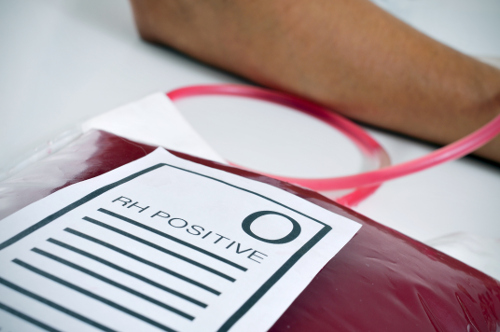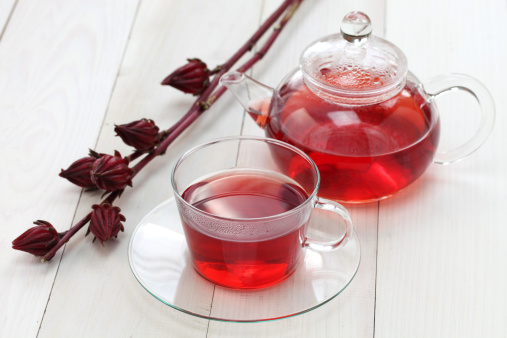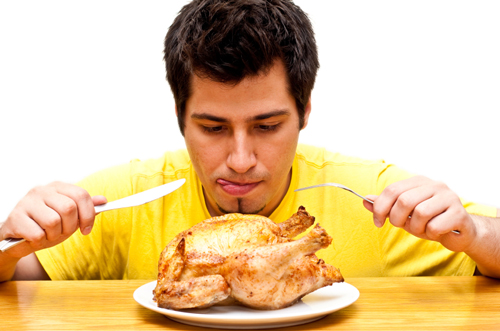
Disclaimer: Results are not guaranteed*** and may vary from person to person***.

Have you heard of the special diet that is recommended to follow for good overall health depending on your blood type?
The Blood Type Diet is based on eating specific foods that allow for better digestion, increase energy levels, prevent disease and illnesses, and help to lose weight.
We will take a close look at this controversial diet, particularly, the O-Positive blood type diet.
The Blood Type Diet, also known as the Blood Group Diet, was first created by naturopath physician, Dr. Peter J. D’Adamo.
He wrote the book Eat Right 4 Your Type to outline how your type of blood chemically reacts to the food you eat. Our blood type refers to the type of antigens, or proteins, within the blood cells and plasma.
There are eight different blood types that fall under the four major blood groups. The presence and absence of these antigens determine the type of blood we have.
It should be noted there are many experts who feel there is not sufficient scientific evidence supporting this type of diet. Katherine Zeratsky is a dietician at the Mayo Clinic.
“There’s no sound scientific evidence that the so-called blood type diet is any more effective or any more beneficial for weight loss than is any other diet. If you’re trying to lose weight, focus on developing healthy eating and exercise habits that you can follow for a lifetime,” Zeratsky states on the clinic’s web site.
Based on this diet, blood type O-positive individuals should consume organic lean meat and poultry, fruits, and vegetables. This high protein and low carbohydrate diet recommends limiting or avoiding wheat products, dairy, caffeine and alcohol.
This diet group is referred to as “The Hunter” and closely follows the lines of the Paleo diet, theorizing that ancestors of O-positive people only ate what they could hunt or gather at the time. Regular exercise of high-functioning workouts is linked to this diet.
To get the best results of any diet, it is recommended to follow the guidelines closely and avoid straying from the suggested foods. The Blood Type O-Positive Diet is no different.
To fully understand how your O-positive blood type may affect the foods you eat, continue reading the following outline of the Dr. D’Adamo diet, which details what foods to eat for the O-positive blood type.
 Foods to Eat and Avoid for Blood Type O-Positive" width="800" height="1947" />
Foods to Eat and Avoid for Blood Type O-Positive" width="800" height="1947" />
According to this diet, blood type O-positive individuals digest meat easily and the iodine in most seafood helps with functioning of the thyroid. It is recommended to have a high-protein diet of organic lean meats such as lamb, beef, veal, venison, and mutton.
You can also enjoy cold-water fish such as trout, herring, tuna, cod, and mackerel. On occasion, you can eat lobster, shrimp, clams, mussels, crab, flounder, and mahi-mahi.
Avoid the meat of goose and pork such as bacon and ham. Fish to avoid include catfish, smoked salmon, caviar, octopus, pickled herring, barracuda, and conch.
Maintain weight, reduce blood clots, and have good health with vitamin- and mineral-enriched leafy greens such as kale, lettuce, and broccoli. Blood type O-positive patients should also eat onions, pumpkins, turnips, dandelion, red peppers, okra, artichokes, garlic, horseradish, parsley, seaweed, and ginger root.
Avoid Brussels sprouts, spinach, cabbage, corn, cauliflower, potatoes, eggplant, alfalfa sprouts, mushrooms, and pickled vegetables to prevent thyroid, insulin, blood clots, and digestive issues.
With this diet, type O-positive individuals can use fruits to help with regulating stomach acid, which tends to be a major issue for this blood type. Enjoy eating cherries, figs, plums, and prunes and sporadically eat raspberries, cranberries, and gooseberries. You can also enjoy apples, peaches, grapes, pears, and bananas up to two times per week.
Avoid potential mold-containing melons such as honeydew and cantaloupe, as well as acid-producing oranges, rhubarb, kiwifruit, strawberries, and blackberries. Coconut can also cause issues for O-positive types.
It may seem tricky to follow, but there are beans and legumes that can help O-positive blood types, while others can cause issues (mainly involving the thyroid). You can consume green string beans, black beans, and adzuki beans.
Avoid green peas, lentils, soybeans, peanuts, and peanut butter itself.
While it has been suggested dairy products should be avoided, this blood type can enjoy butter, soymilk, goat cheese, feta cheese, and mozzarella cheese in small amounts.
Cooking oils of sesame and canola oil, and breads prepared with sprouted grains such as barley, spelt, amaranth, millet, and rye, with rice, kasha, and kamut products are safe for this blood type. Avoid corn, cottonseed, peanut, and safflower oils as well as cereal grain products, cashews, brazil nuts, pistachios, and poppy seeds.
We have compiled a sample meal plan for one day based on how you can eat right for your blood type O-Positive.
2 slices of Ezekiel bread toasted
6 ounces of vegetable juice
1 cup of herbal tea
6 ounces of organic roast beef
1 sliced apple or pineapple
1 glass of water
1 cup of herbal tea, beer, or wine
Twice a day you can enjoy a snack of fruit, raw vegetables, roasted seeds or nuts, or gluten-free cake with a cup of herbal tea or water.
Aside from the particular foods suggested for O-positive blood types, this diet also recommends followers avoid the use of caffeine and most alcoholic beverages, while enjoying wine, teas, and water.
The diet is aimed to balance brain chemicals such as dopamine, further suggesting that individuals using the diet can prevent substance abuse and reduce stress and anxiety.
Exercise is suggested to comprise of 150 minutes of aerobic exercises each week and two days dedicated to strength training.
The O-Positive Blood Type Diet is similar to other diets on the market in that there are concerns among the medical community and many experts call for more scientific research to be done. Following this diet may strengthen vulnerable health issues and weaken others where required nutrients are needed.
Dr. D’Adamo created the diet to target the impact blood type has on the digestion of certain foods in our body. Any new dietary regimen should be discussed with a health professional, especially if you have an existing health condition.
Sources:
“The Blood Type Diet,” Dr. Peter J. D’Adamo & The Blood Type Diet; http://www.dadamo.com/, last accessed March 27, 2017.
Freeman, D., “Blood Type Diet Debunker: Does it Really Work?” CBS News, October 6, 2010; http://www.cbsnews.com/news/blood-type-diet-debunker-does-it-really-work/, last accessed March 27, 2017.
“The Blood Type Diet,” Web MD; http://www.webmd.com/diet/a-z/blood-type-diet, last accessed March 27, 2017.
Braverman, J., “Blood Type O Positive Diet Foods,” Livestrong, April 13, 2015; http://www.livestrong.com/article/237156-blood-type-o-positive-diet-foods/, last accessed March 27, 2017.
“Blood Type O Meal Plans,” SF Gate; http://healthyeating.sfgate.com/blood-type-o-meal-plans-9746.html, last accessed March 27, 2015.
“O Positive Blood Type Diet,” MD Health; http://www.md-health.com/O-Positive-Blood-Type-Diet.html, last accessed March 27, 2017.
Matus, Mizpah, B.Hlth.Sc. (Hons), “Blood Type Diet Explained and Simplified,” Diet Blog; https://www.diet-blog.com/16/blood-type-diet.php, last accessed March 27, 2017.




ABOUT DOCTORS HEALTH PRESS
CONNECT WITH US
Disclaimer: The information contained herein is for information purposes only and is not to be construed as a diagnosis, treatment, preventive, or cure for any disease, disorder, or abnormal physical state, nor should it be considered a substitute for medical care from your doctor. On any matter relating to your health or well-being—and prior to undertaking any health-related activity—consult an appropriate health professional. The opinions herein are exactly that, they are the opinions of the author. Doctors Health Press and its employees are not responsible for medically unsupervised activities that could be harmful to your health. Results are not guaranteed*** and may vary from person to person***. All of the Doctors Health Press publications come with a 100% satisfaction guarantee. If you’re not satisfied with your newsletter, you can simply cancel your subscription and receive a pro-rated refund on all undelivered issues. For our books and special reports, we will give you a full refund of your purchase price within 30 days of your order. We pride ourselves on excellent customer service.
Disclaimer: The information contained herein is for information purposes only and is not to be construed as a diagnosis, treatment, preventive, or cure for any disease, disorder, or abnormal physical state, nor should it be considered a substitute for medical care from your doctor. On any matter relating to your health or well-being—and prior to undertaking any health-related activity—consult an appropriate health professional. The opinions herein are exactly that, they are the opinions of the author. Doctors Health Press and its employees are not responsible for medically unsupervised activities that could be harmful to your health. Results are not guaranteed*** and may vary from person to person***. All of the Doctors Health Press publications come with a 100% satisfaction guarantee. If you’re not satisfied with your newsletter, you can simply cancel your subscription and receive a pro-rated refund on all undelivered issues. For our books and special reports, we will give you a full refund of your purchase price within 30 days of your order. We pride ourselves on excellent customer service.